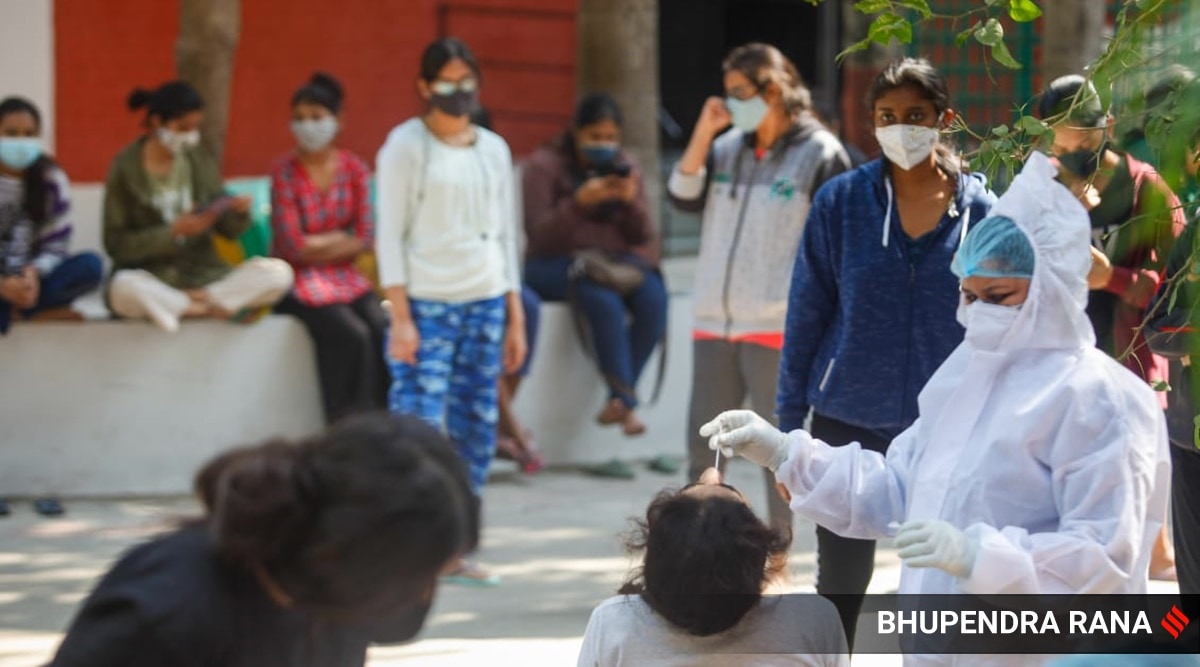January 23, 2022 4:42:51 am
 Students at the Home Science Faculty of Maharaja Sayajirao University being tested for Covid-19. (Express Photo by Bhupendra Rana)
Students at the Home Science Faculty of Maharaja Sayajirao University being tested for Covid-19. (Express Photo by Bhupendra Rana) Written by Dr Shashank Heda
AS IS the case with most other things these days, there are sharp disagreements within various stakeholders over the response measures being applied to contain the Covid-19 epidemic. This trend is not limited to India, or any other individual country, but is pervasive through most mature democracies. In some instances, this disagreement is erecting major hurdles in executing an outcome-oriented Covid strategy. Unfortunately, a commonly-agreed framework and model to deal with the crisis is still missing.
A common framework is essential to provide a vision and strategy. Stakeholders are unlikely to align on a commonly-shared vision unless they are convinced with the effectiveness and importance of this minimal viable framework and a model.
An useful example in this regard could be the presence of the military. In most countries, almost everyone is aligned with the military because the threat perception is shared across the stakeholders. It is almost unlikely to see individual regions squabbling on retaining a part of the army for their petty stakes. Covid is no different. With life, livelihoods and economies devasted, we should, at least now, realise it as a potential threat to the nation and align on a shared vision, common framework, and a shared model. Creating a shared vision will be conducive to adopting preventive measures and reducing compliance.
I wish to cite a few areas where we can benefit from executing a well-thought-out collective vision, strategy, and framework.
Vaccination strategy
Vaccination strategy, in most cases, is equated with prioritisation of vaccination in the older age groups, and those with co-morbidities or other vulnerabilities. While this is an useful tactical decision, this alone cannot be a long-term strategy. In simple terms, a strategy can be defined as the structured way of anticipating and achieving the desired vision. It is not about the immediate milestones or objectives. Since it is focused on the desired vision, it provides resilience with permutations and calibration of options to achieve the desired objectives.
A Covid mitigation strategy should help us minimise the impact and implications of the epidemic on the lives, livelihoods and the economy. Thus, staying ahead of the Covid curve becomes imperative. Concurrently, anticipating demand-supply shock or a sudden burst of regional clusters should be anticipated with a mitigation plan that should kick in with minimal delays just as a runbook.
A vaccine strategy should factor in the delay from availability, logistics, and execution. We cannot ignore vaccine hesitancy among some groups of people because the reluctance of a few to get themselves vaccinated helps further propagation of the virus.
Those refusing to vaccinate themselves can be stripped of certain privileges. Refusing vaccination can be considered similar to drink-and-drive or tax evasion kind of situations. An individual has the right to drink, but not the right to drive while drunk. Anti-vaxxers should be considered equivalent to those found in non-compliance with tax laws.
Similarly, hotspot identification and containment should become a national priority, not a regional or local concern, as we have seen local hotspots triggering national waves.
Value Chain Analysis
While all efforts are being focussed on strengthening the healthcare infrastructure, and understandably so, an effective strategy would require the idea of Covid infrastructure to be expanded to include all essential services that are needed for business continuity and minimising disruption of economic activity.
Thus, electricity, water, road, transport, essential supplies, financial institutions and many others must be considered part of critical infrastructure needed to deal with the epidemic. A value-chain analysis needs to be done across these domains to identify weaknesses, and prepare for contingencies.
Surveillance
Our experience with this pandemic so far tells us that we need to keep expecting the unexpected. That means we need to have a fairly robust surveillance and intelligence, which can warn us about newer variants in time for us to take pre-emptive actions. Testing and contact tracing need to be complemented with other methods of surveillance like regular analysis of waste water from multiple locations. In addition, sentinel surveillance focused on clinical profile should be tracked formally in every part of country.
Dr Shashank Heda is founder and chief executive of CovidRxExchange, a global non-profit organisation registered with the US Goverment, working towards the dissemination of expertise and insight in Covid-19 medical care.
- The Indian Express website has been rated GREEN for its credibility and trustworthiness by Newsguard, a global service that rates news sources for their journalistic standards.

